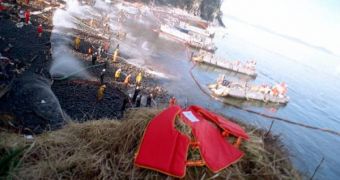According to naturalists, certain types of microbes that can be found in nature have the potential to simply dissolve petrochemical residues, which means that they could possibly be used to break up major oil spills whenever they happen. The microorganisms attack only the oil molecules, breaking them up and rendering them harmless. If scientists manage to create a substance containing these lifeforms, one that could potentially be spread across disaster zones, then authorities could benefit from this type of assistance to a great extent.
Experts from the University of Essex have revealed their new study on Monday, March 30th, at the Society for General Microbiology meeting, held in Harrogate. Their paper holds that in regular conditions, namely when oxygen is present, thus in an aerobic circumstances, the analyzed microbes, which only live in certain mudflat regions, have been able to significantly break down various chemical compounds that occur in petroleum, including benzene, toluene, and naphthalene.
However, they note, the action has been very much slowed down in anaerobic environments, where oxygen was not present. Under these circumstances, the microbes have only managed to destroy limited amounts of toluene, but have failed to break the structural integrity of other compounds.
These results carry very important implications for the use of these organisms in real-life conditions. The experts, who have been led by Dr Efe Aganbi, say that an oil spill occurring in waters where the ecosystem is healthy would be no match to their microbes. On the downside, if oil is spilled in polluted areas of oceans or seas, then all the oxygen in the water will be processed in algae and other invasive plants, and the oil itself will linger, as the microbes will not be able to harm it in any way.
“Our work shows that microbes are very versatile and can live on most types of chemicals. More work is needed to identify bacteria in these mud sediments as little is known about the range of bacteria present. Estuaries are ideal locations for refineries and petrochemical facilities – it is essential that mudflats are preserved to provide a natural clean-up area for pollution,” Aganbi explains.

 14 DAY TRIAL //
14 DAY TRIAL //